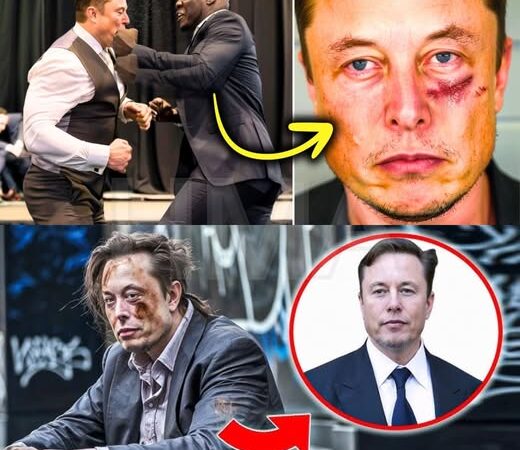At a renowned science and technology conference, a dramatic moment captivated the audience when Elon Musk, the visionary behind Tesla and SpaceX, faced sharp criticism. A man named Xavier accused Musk of being a fraud, claiming he profited from “flashy projects” while ignoring pressing real-world issues.
As Xavier’s words echoed through the hall, Musk maintained his composure and issued a challenge: “Why don’t you come up here and share your perspective?” What ensued was a gripping exchange that revealed much about both men.

The Critique:
Xavier accused Musk of prioritizing “toys for the wealthy” over addressing urgent societal challenges. His comments resonated with critics who see Musk as a polarizing figure—revered by some as a pioneer, dismissed by others as a profiteer.
Instead of reacting defensively, Musk calmly presented a timeline of his career, highlighting the risks, failures, and breakthroughs that defined his journey. He recounted saving Tesla from bankruptcy, transforming space exploration through SpaceX, and committing to solving some of humanity’s toughest challenges.
The Turning Point:
As Musk spoke, Xavier’s confidence began to waver. He glimpsed a different side of Musk—not just an entrepreneur but someone driven by a mission to redefine possibilities. Musk’s pointed question, “What have you done to change the world?” struck a chord, prompting Xavier to reflect on his own contributions.
The Broader Message:
While Xavier’s critique stemmed from frustration and a call for justice, Musk acknowledged an uncomfortable reality: change is imperfect, and progress often comes with challenges. He admitted his journey’s flaws but emphasized the importance of persistence and innovation in driving meaningful change.
A Lesson for Everyone:
This encounter wasn’t just a clash of personalities; it illuminated the complexities of leadership and societal transformation. It encouraged the audience—and likely Xavier—to reconsider their roles in shaping the future.
Ultimately, the exchange left a lasting impact. Musk’s achievements didn’t shield him from criticism, but they highlighted the value of vision and action. Xavier’s courage in voicing his concerns wasn’t in vain—it sparked a powerful dialogue about accountability, introspection, and striving for a better world.
Elon Musk convinced Tesla investors to back his pay. Now he must persuade a judge.

Elon Musk, Chief Executive Officer of SpaceX and Tesla and owner of Twitter, gestures as he attends the Viva Technology conference dedicated to innovation and startups at the Porte de Versailles exhibition centre in Paris, France, June 16, 2023. REUTERS/Gonzalo Fuentes/File Photo/
WILMINGTON, Delaware, June 13 (Reuters) – Tesla has convinced an army of small investors and major funds to ratify Elon Musk’s $56 billion pay package. Now comes the harder part: persuading an already skeptical Delaware judge to recognize it.
The company said Thursday that shareholders had approved both Musk’s pay package and a board-sponsored move of Tesla’s legal home to Texas from Delaware.
Musk is the driving force of Tesla and responsible for many of its advances, leading to vocal support for the pay package especially among small shareholders. Still, sales and stock price have fallen recently, adding to concerns that produced a concerted ‘no’ vote.
Before Tesla can give the shares to Musk, there will likely be months of litigation over the pay ratification vote, Musk’s efforts to rally shareholders in support of his compensation and the appeal of the original ruling, four months after a Delaware judge voided the pay package.
A final legal result in Musk’s favor is not certain and will not be quick.
Judge Kathaleen McCormick of Delaware’s Court of Chancery rescinded the pay package in January because she found that Musk improperly controlled the 2018 board process to negotiate it. She also ruled that Tesla failed to fully inform investors before they voted for it.
“This thing is not over,” said Brian Quinn, professor at Boston College Law School. He said McCormick will require Tesla to prove the vote was uncoerced, and the timing and strategy were not influenced by Musk. “So when they show up (to the Delaware court) saying it’s all good now, they’re going to have to come with receipts.”
As Tesla sees it, Thursday’s shareholder vote essentially reached back in time and corrected the 2018 shareholder vote by disclosing enormous amounts of information to investors, including McCormick’s 200-page ruling.
Tesla argued it corrected the problem of Musk’s domination of the process to negotiate the pay package as well. It created a special committee eventually composed only of Kathleen Wilson-Thompson, an independent board member, who reviewed the 2018 pay deal and decided it was in the best interest of shareholders.
But Tesla also acknowledged in securities filings that a favorable ratification might not resolve the pay dispute. Ratification is primarily seen as a tool for fixing problems such as technical glitches in corporate documents.



